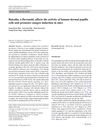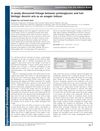 22 citations,
December 2014 in “Naunyn-Schmiedeberg's Archives of Pharmacology”
22 citations,
December 2014 in “Naunyn-Schmiedeberg's Archives of Pharmacology” Baicalin helps hair grow by boosting certain cell activities and speeding up hair cycle in mice.
 22 citations,
May 2013 in “Experimental and Therapeutic Medicine”
22 citations,
May 2013 in “Experimental and Therapeutic Medicine” Minoxidil improves quality of life for women with hair loss.
 21 citations,
March 2018 in “Experimental Dermatology”
21 citations,
March 2018 in “Experimental Dermatology” The guide explains how to study human skin fat cells and their tissue, aiming to improve research and medical treatments.
 20 citations,
May 2016 in “Journal of Cosmetic Dermatology”
20 citations,
May 2016 in “Journal of Cosmetic Dermatology” Low vitamin D receptor levels found in hair loss patients; topical vitamin D treatment suggested.
 20 citations,
August 2015 in “International Journal of Molecular Medicine”
20 citations,
August 2015 in “International Journal of Molecular Medicine” Human placental extract may help hair growth by affecting certain cell signals and could be more effective with minoxidil.
 20 citations,
July 2006 in “Veterinary dermatology”
20 citations,
July 2006 in “Veterinary dermatology” Melatonin helped some Pomeranian dogs regrow hair, but it wasn't linked to estrogen receptors.
 17 citations,
May 2014 in “Naunyn-Schmiedeberg's Archives of Pharmacology”
17 citations,
May 2014 in “Naunyn-Schmiedeberg's Archives of Pharmacology” 7-Phloroeckol from brown algae may help hair grow.
 17 citations,
May 2010 in “Journal of Dermatological Science”
17 citations,
May 2010 in “Journal of Dermatological Science” Erythropoietin helps hair grow and could be a potential treatment for hair loss.
 17 citations,
December 2001 in “Journal of Investigative Dermatology”
17 citations,
December 2001 in “Journal of Investigative Dermatology” The osteopontin gene is active in a specific part of rat hair follicles during a certain hair growth phase and might affect hair cycle and diseases.
 15 citations,
May 2020 in “BMC complementary medicine and therapies”
15 citations,
May 2020 in “BMC complementary medicine and therapies” Polygonum multiflorum extract helps hair grow longer and fights the effects of hormones that cause hair loss.
 15 citations,
January 2010 in “Experimental Dermatology”
15 citations,
January 2010 in “Experimental Dermatology” Hair loss in certain young mice is linked to a specific gene and can be caused by lack of iron.
 15 citations,
September 2008 in “Archives of Dermatological Research”
15 citations,
September 2008 in “Archives of Dermatological Research” Roxithromycin, an antibiotic, can increase hair growth and might be used as a treatment for hair loss.
 13 citations,
July 2016 in “BMC Complementary and Alternative Medicine”
13 citations,
July 2016 in “BMC Complementary and Alternative Medicine” Hominis Placenta helps hair grow back by increasing cell growth and a specific growth factor.
 13 citations,
June 2007 in “Journal of Dermatological Science”
13 citations,
June 2007 in “Journal of Dermatological Science” Researchers created a cell line to study hair growth and found specific genes affected by dihydrotestosterone.
 12 citations,
December 2009 in “Amino Acids”
12 citations,
December 2009 in “Amino Acids” Putting α-methylspermidine on mouse skin can start hair growth.
 11 citations,
February 2019 in “Journal of Cosmetic Dermatology”
11 citations,
February 2019 in “Journal of Cosmetic Dermatology” Low zinc and biotin levels linked to male hair loss; supplements may help.
 10 citations,
August 2014 in “Experimental Dermatology”
10 citations,
August 2014 in “Experimental Dermatology” Decorin, a protein, may help start hair growth and could be used to treat hair loss.
 10 citations,
May 2012 in “PloS one”
10 citations,
May 2012 in “PloS one” Low ERCC3 gene activity is linked to non-pigmented hair growth.
 9 citations,
February 2022 in “Nature communications”
9 citations,
February 2022 in “Nature communications” Rare changes in the KRT82 gene are linked to a higher risk of Alopecia Areata.
 9 citations,
January 2015 in “Laboratory Animal Research”
9 citations,
January 2015 in “Laboratory Animal Research” Laminaria japonica and Cistanche tubulosa extracts combined may effectively promote hair growth.
 9 citations,
August 2013 in “Archives of Dermatological Research”
9 citations,
August 2013 in “Archives of Dermatological Research” A gene called BMAL1 plays a role in controlling hair growth.
 8 citations,
December 2018 in “Journal of Dermatological Treatment”
8 citations,
December 2018 in “Journal of Dermatological Treatment” The PRP-like cosmetic with biomimetic peptides is potentially effective and safe for treating alopecia areata.
 8 citations,
May 2017 in “Chinese Journal of Integrative Medicine”
8 citations,
May 2017 in “Chinese Journal of Integrative Medicine” Miscanthus sinensis flower extract may help promote hair growth and prevent hair loss.
 7 citations,
November 2000 in “Clinics in Dermatology”
7 citations,
November 2000 in “Clinics in Dermatology” Most hair loss in children is caused by a few common conditions and is easy to diagnose, but rare types require careful evaluation.
 6 citations,
May 2020 in “Scientific reports”
6 citations,
May 2020 in “Scientific reports” Researchers identified genes and proteins that may influence wool thickness in sheep.
 6 citations,
January 2020 in “Postepy Dermatologii I Alergologii”
6 citations,
January 2020 in “Postepy Dermatologii I Alergologii” Check and treat low iron and vitamin D levels in people with hair loss.
 6 citations,
July 2015 in “European Journal of Dermatology”
6 citations,
July 2015 in “European Journal of Dermatology” Stopping methotrexate might reverse lymphoma-like conditions in some patients.
 6 citations,
November 2007 in “British Journal of Dermatology”
6 citations,
November 2007 in “British Journal of Dermatology” Fulvestrant solution doesn't help hair loss in men and postmenopausal women.
 4 citations,
May 2019 in “Skin Research and Technology”
4 citations,
May 2019 in “Skin Research and Technology” Finasteride helps hair growth but stopping it causes faster hair loss.
 4 citations,
January 2014 in “International Journal of Trichology”
4 citations,
January 2014 in “International Journal of Trichology” A 12-year-old boy with a rare genetic condition has progressive hair loss with no effective treatment.






























